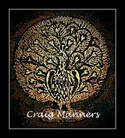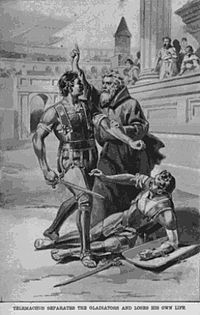|
"In the 4th century there lived an Asiatic monk who had spent most of his life in a remote community of prayer, raising vegetables for the cloister kitchen. When he was not tending his garden spot, he was fulfilling his vocation of study and prayer.
“Then one day this monk named Telemachus felt that the Lord wanted him to go to Rome, the capital of the world – the busiest, wealthiest, biggest city in the world. Telemachus had no idea why he should go there, and he was terrified at the thought. But as he prayed, God’s directive became clear. “How bewildered the little monk must have been as he set out on the long journey, on foot, over dusty roads westward, everything he owned on his back. Why was he going? He didn’t know. What would he find there? He had no idea. But obediently, he went. “Telemachus arrived in Rome during the holiday festival. You may know that the Roman rulers kept the ghettos quiet in those days by providing free bread and special entertainment called circuses. At the time Telemachus arrived the city was also bustling with excitement over the recent Roman victory over the Goths. In the midst of this jubilant commotion, the monk looked for clues as to why God had brought him there, for he had no other guidance, not even a superior in a religious order to contact. “Perhaps, he thought, it is not sheer coincidence that I have arrived at this festival time. Perhaps God has some special role for me to play. “So Telemachus let the crowds guide him, and the stream of humanity soon led him into the Coliseum where the gladiator contests were to be staged. He could hear the cries of the animals in their cages beneath the floor of the great arena and the clamor of the contestants preparing to do battle. “The gladiators marched into the arena, saluted the emperor, and shouted, ‘We who are about to die salute thee.’ Telemachus shuddered. He had never heard of gladiator games before, but had a premonition of awful violence. “The crowd had come to cheer men, who for no reason other than amusement, would murder each other. Human lives were offered for entertainment. As the monk realized what was going to happen, he realized he could not sit still and watch such savagery. Neither could he leave and forget. He jumped to the top of the perimeter wall and cried, ‘In the name of Christ, stop!’ “The fighting began, of course. No one paid the slightest heed to the puny voice. So Telemachus pattered down the stone stops and leapt onto the sandy floor of the arena. He made a comic figure – a scrawny man in a monk’s habit dashing back and forth between muscular, armed athletes. One gladiator sent him sprawling with a blow from his shield, directing him back to his seat. It was a rough gesture, though almost a kind one. The crowd roared. “But Telemachus refused to stop. He rushed into the way of those trying to fight, shouting again, ‘In the name of Christ, stop!’ The crowd began to laugh and cheer him on, perhaps thinking him part of the entertainment. “Then his movement blocked the vision of one of the contestants; the gladiator saw a blow coming just in time. Furious now, the crowd began to cry for the interloper’s blood. “Run him through,” they screamed. “The gladiator he had blocked raised his sword and with a flash of steel, struck Telemachus, slashing down across his chest and into his stomach. The little monk gasped once more, ‘In the name of Christ, stop.’ “Then a strange thing occurred. As the two gladiators and the crowd focused on the still form on the suddenly crimson sand, the arena grew deathly quiet. In the silence, someone in the top tier got up and walked out. Another followed. All over the arena, spectators began to leave, until the huge stadium was emptied. “There were other forces at work, of course, but that innocent figure lying in the pool of blood crystallized the opposition, and that was the last gladiatorial contest in the Roman Coliseum. Never again did men kill each other for the crowds’ entertainment in the Roman arena.” This story of Telemachus from Church historian Theodoret is reprinted with gratitude from, "Loving God," by Charles Colson, pages 241-243. (I heartily recommend this book.) Some further information can be found regarding Telemachus at: https://en.wikipedia.org/wiki/Saint_Telemachus http://www.reagan.utexas.edu/archives/speeches/1984/20284a.htm
0 Comments
Your comment will be posted after it is approved.
Leave a Reply. |
Craig MannersWhile much of what is written in this Blog may currently appear to be counter-cultural, given our post-truth culture, it is in no way counter-human beings. I am always for people no matter what they think, do, or may have done in their past. Where I put forward ideas or debate against certain ideology, behaviour, ideas, movements, politics, I remain very much on the side of the human beings even though I may be opposed to their worldview, behaviour and politics. Such opposition is generally out of concern for the ultimate consequences of such behaviour or ideas, especially for children. |
- Africa
- Reflections by Craig Manners
-
Articles by Craig Manners
- While We Wait by Craig Manners
- Written on our Hearts by Craig Manners
- Cure for Death by Craig Manners
- Perfect Justice, Perfect Mercy. Only God Could do This. By Craig Manners
- Authority By Craig Manners
- Creation and Providence by Craig Manners
- Forgiveness by Craig Manners
- All Things for Good by Craig Manners
- A Complete Education by Craig Manners
- Humans. Moral beings or not?
- Soviet Era Mass Conversion Therapy Mind Control Set to Control the West by Craig Manners
- On the Road to Adelong by Craig Manners >
- What is Christianity all about? >
- Note Pad
- To be Frank!
- A Cultural Revolution
- Wanted: Men who Understand the Times
- Grieved by the Grievance Virus
Contact Craig Manners
Copyright Craig Manners © 2016 to 2019

